Claims arising from conveyancing are regular and consistent in nature. Time and cost pressures, in what is a very technical area of the law, can result in simple errors.
Guide to Property Taxes (Victoria)
Practitioners are often engaged by a client to ‘do the conveyancing’ associated with the sale or purchase of real property. Typically, they are not specifically instructed to provide taxation or stamp duty advice, but there is usually no transaction relating to real property that doesn’t have taxation or duty implications
Transfer duty and landholder duty
Transfer duty is a tax on 'dutiable transactions' in respect of 'dutiable property', with each of these concepts being defined in the Duties Act.
Land Tax
Land tax is assessed on the unimproved value of most types of land ('taxable land') owned on 31 December each year.
Commercial and Industrial Property Tax
A new regime for duty and tax treatment of commercial and industrial properties commenced in Victoria on 1 July 2024.
Goods and Services Tax
Goods and Services Tax (GST) is a 10% value added tax payable on supplies of most goods and services.
Tax Issues
This checklist covers the most common tax issues and related charges. Includes duty, CGT, lodging fees, land tax and subdivisions.
Parent to child property loans: Things to consider - Client Brochure
This brochure is provided by LPLC as a template for lawyers to use for client information purposes. The brochure outlines what your clients should consider when they are planning to provide financial assistance to their child for the purpose of buying a home. Firms can use the sample brochure as it is, or use the word version to tailor the wording to suit their needs or create their own branded brochure.
Checklist for advising purchasers when vendors default
Advice practitioners need to give purchasers when vendors are in breach of the contract of sale, to enable the purchasers to make informed decisions.
Many of these issues are also relevant to advising vendors who have breached the contract.
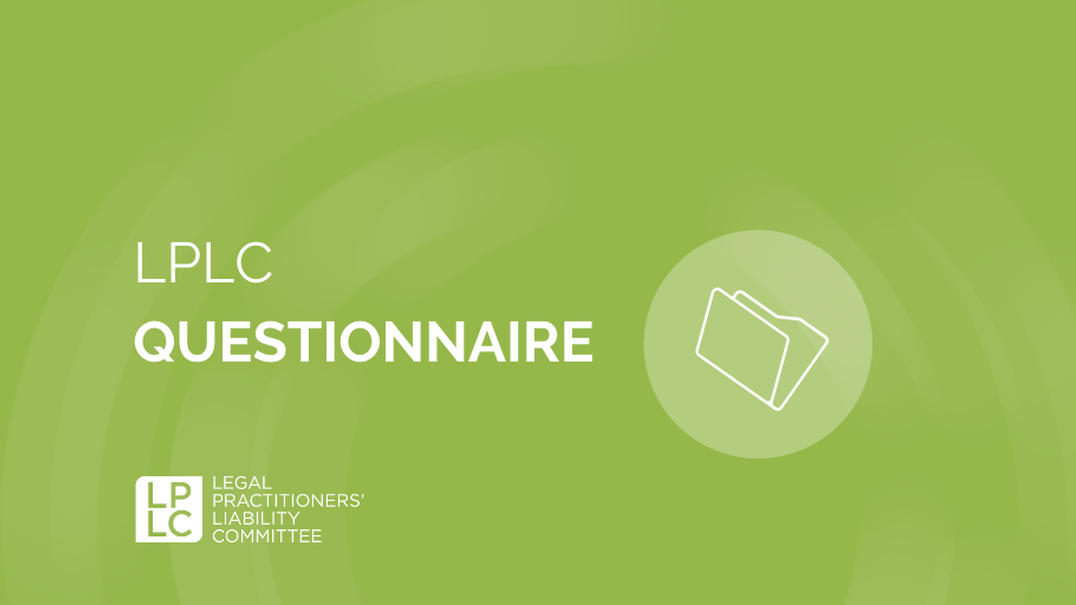
Sale of land - questions for the vendor
This checklist contains essential questions for the vendor during the sale of land.

Purchase of land – questions for the purchaser
This questionnaire includes questions to ask purchasers of land and indicates when practitioners may be required to seek additional information.
Windfall gains tax support service
Struggling to find the answer to a question about Windfall Gains Tax (WGT)? LPLC can help.
Windfall Gains Tax Fact Sheet — Act Now
The new Windfall Gains Tax (WGT) will potentially impact real estate transactions that your clients enter into now, if those transactions relate to land in Victoria that is rezoned on or after 1 July 2023.
Clients should be alerted to the potential tax liability and how it may apply to them.
Subdivision limitations
Time limits most commonly missed in relation to subdivision.
Tax limitations
Time limits most commonly missed in relation to tax.
Bankruptcy limitations
Time limits most commonly missed in relation to bankruptcy.
Contribution limitations
Time limits most commonly missed in relation to contributions.
Contracts limitations
Time limits most commonly missed in relation to contracts.
Confiscation limitations
Time limits most commonly missed in relation to confiscation, a claim example and lesson learned.
Appeals limitations
Time limits most commonly missed in relation to appeals, a claim example and lessons learned.
Personal properties securities limitations
Time limits most commonly missed in relation to personal properties securities, a claim example and lessons learned.
Land acquisition limitations
Time limits most commonly missed in relation to land acquisition.
International contracts for the sale of goods limitations
Time limits most commonly missed in relation to international contracts for the sale of goods.
Instruments limitations
Time limits most commonly missed in relation to instruments, a claim example and lesson learned.
Liquidator limitations
Time limits most commonly missed in relation to liquidation, a claim example and lessons learned.
Caveats limitations
Time limits most commonly missed in relation to caveats, a claim example and lessons learned.
Superannuation checklist
This checklist is designed to help practitioners avoid common mistakes when acting in superannuation matters. Practitioners may find it helpful to use it alongside our Superannuation practice risk guide

Know your limits
With the proliferation of time limits in legislation today, missing limitation dates is a mistake that occurs in many areas of the law leading to claims. This LPLC Practice Risk Guide lists the limitation periods that have caught practitioners out in recent years. It also gives some claims examples of how the mistakes have occurred and the lessons we can learn from those mistakes.

Superannuation — LPLC Practice Risk Guide
This LPLC Practice Risk Guide focuses on helping practitioners to avoid the types of claims relating to superannuation matters that arise in family law, wills and estates and property work. In all areas simple oversight is the most common cause of claims.
Default Notice Proforma
There is no prescribed form for a default notice. LPLC has developed a sample proforma default notice to assist practitioners. Importantly, the recipient must be able to determine with reasonable certainty what action needs to be taken in order to comply. That is, the notice must identify the default, set out how to rectify the default including how much money needs to be paid if payment is outstanding and the time provided in the contract to remedy the default and refer to the relevant provision in the contract. The sample notice is provided in a word format for practitioners to amend as needed.
Rescission Notice Pro-forma
There is no prescribed form for a rescission notice. LPLC has developed a sample proforma rescission notice to assist practitioners. Importantly, the recipient must be able to determine with reasonable certainty what action needs to be taken in order to comply. That is, the notice must identify the default, set out how to rectify the default including how much money needs to be paid if payment is outstanding, give the consequences if the default is not remedied and the time provided in the contract to remedy the default and refer to the relevant provision in the contract. The sample notice is provided in a word format for practitioners to amend as needed.
Foreign purchaser additional duty – does it apply?
Practitioner flowchart
'Foreign purchaser additional duty' (FPAD) provisions have now been in place in the Duties Act 2000 (Vic) (Vic Duties Act) for over five years.
From 1 March 2020, the Victorian State Revenue Office (SRO) changed its approach to FPAD in the context of acquisitions of residential property made by 'family' discretionary trusts. The change of approach has meant there has been, and will be, an increase in discretionary trusts found by the SRO to be foreign trusts liable to pay FPAD when acquiring residential property.
Practitioners practicing in conveyancing matters need to be aware of the way the FPAD regime works for discretionary trusts so that clients can be advised of its application. Use this flowchart as a guide for providing advice clients about any applicable FPAD.
Timing is everything to avoid double duty
UPDATE
Our flowchart Timing is everything to avoid double duty was updated on 19 March 2025 to take account of the updated State Revenue Office Revenue Ruling DA-064v2 Land transfer duty - meaning of land development.Practitioner flowchart
Advising the purchaser at the beginning of the retainer about the duty implications associated with the timing of land development and nominations, and then again before the nomination occurred, can avoid double duty claims.
Use this flowchart as a guide for when to provide advice and when there is no double duty risk.
LPLC also strongly recommends conveyancing practitioners review their letters of advice to ensure they contain warnings about this issue.
Face to face verification of identity
A step-by-step process and checklist for face-to-face verification of identity (VOI).
VOI client information for practitioners
This document is an annotated version on the VOI Client Information Sheet designed to assist practitioners while using it. The VOI client information sheet is designed to send to the client before they attend your office to inform them what to bring to the interview and to obtain details from them beforehand.
VOI client information sheet
This VOI client information sheet is designed to send to the client before they attend your office to inform them what to bring to the interview and to obtain details from them beforehand.

Claim Free Conveyancing
Claim free conveyancing is an LPLC Practice Risk Guide produced to help practitioners identify and avoid the most common mistakes resulting in claims in conveyancing transactions. The guide aims to raise awareness of how and why mistakes occur, and put practitioners in a better position to stay claim free.
Vendor's practitioner checklist
This checklist will help you to avoid many mistakes made by vendor’s practitioners in conveyancing transactions.
Purchaser's Practitioner Checklist
This checklist will help you to avoid many mistakes made by purchaser’s practitioners in conveyancing transactions.
Checklist for advising vendors when purchasers default
This checklist provides guidance on the advice practitioners need to give vendors when purchasers are in breach of the contract, to enable the vendors to make an informed decision.
Many of these issues are also relevant to advising purchasers who have breached the contract.

Managing mortgage risk
This LPLC Practice Risk Guide guide examines the risks involved in acting for lenders, borrowers and guarantors.
Electronic Property Transactions
A checklist covering common issues faced by legal practitioners when dealing with electronic property transaction matters.
Electronic Property Transactions – Office Management
A checklist containing a list of issues to consider when writing office policy regarding electronic property transactions and recommended responses.
Conveyancing Resources
A list of links to resources from both LPLC and the wider legal industry that are useful in conveyancing matters.
Property websites and comments
This checklist is a list of links to web resources relating to property that will help you conduct research. LPLC has provided commentary under each resource to explain best how to use it.

Conveyancing of Accessory or Car Park Lots on Strata Plans or Cluster Plans
Failing to properly identify and manage accessory lots contained in strata or cluster plans can lead to claims against solicitors
Timing issues with deposit bonds and Contracts of Sale of Land
Deposit bonds in conveyancing transactions require solicitors to consider and manage more issues than a cash deposit. In particular, the date when a deposit bond may expire.

September 2025 update to the Real Estate Institute of Victoria (REIV) / Law Institute of Victoria (LIV) Contract of Sale of Land
Conveyancing solicitors need to be aware of key amendments that have been made to the REIV / LIV Contract of Sale of Land.

Council Building Information Certificates and Section 32 Statements
Obtaining a council building information certificate to comply with section 32E of the Sale of Land Act 1962 (Vic) can reduce the risk of a purchaser voiding a contract of sale of land.

ARNECC requirements for Verification of Identity and Client Authorisation
Verifying the identity of the client is a strict requirement for practitioners and conveyancers when handling property transactions.

Early release of a deposit
Early release of a deposit under Section 27 is a statutory right—not a contractual one—and must be strictly followed.
Share and unit transfers may be a dutiable transaction
Practitioners advising on or transferring shares in a private company or units in a unit trust should be alert to potential duty consequences.
Nomination risks when purchasing property
Nominating a new purchaser under a contract of sale of land is fraught with risk. LPLC continues to see claims where purchaser clients enter into a contract (or option) to purchase land and then nominate a substitute or new purchaser after applying for a planning permit, building permit or undertaking other land development activities.
Subject to finance requires strict compliance
Many contracts for the sale of land include a ‘subject to finance’ clause giving the purchaser the right to end the contract if they cannot get loan approval. The clause imposes a number of things that the purchaser must do, usually within a tight time frame, before they can use the clause to end the contract.
Sunset clauses in off the plan sales
The Sale of Land Act 1962 (Vic) regulates a vendor’s right to end a contract of sale pursuant to a ‘sunset clause’ in residential off the plan sale contracts (ROTP contracts).
Make it a rule to include water information certificates
There is a good reason why you should always include a water information certificate in a section 32 statement. The certificates will show the water and sewer lines, which are unregistered easements, and need to be disclosed.
Nomination and the risk of double duty
LPLC continues to see claims involving land transfer duty (stamp duty) and other state property taxes.
Warn vendor clients of terms contract risk
This article addresses the risks associated with contracts that are completed and executed by the agent and/or parties without the further involvement of the vendor’s solicitor.
Commercial and Industrial Property tax questions and answers
Changes to stamp duty and the introduction of an annual property tax on commercial and industrial land under the Commercial and Industrial Property Tax Reform Act commenced 1 July 2024. Practitioners acting in matters involving commercial or industrial land in Victoria need to be aware of the full extent of these significant reforms.
LPLC has provided comprehensive information about the reforms in the article Commercial and Industrial Property Tax reform in Victoria — What you need to know, and a webinar Commercial and Industrial Property Tax (CIPT): Navigating the new reform.
Here we provide some additional answers to specific questions we have received from practitioners. We recommend practitioners use this information to gain a full understanding of the reforms and their practical application.
Commercial and Industrial Property Tax reform in Victoria — What you need to know
The Commercial and Industrial Property Tax Reform Bill (the Bill) was introduced into the Victorian Parliament on 20 March 2024. The reforms are expected to pass into law in early May before commencing on 1 July 2024 (Note: the Act was passed in the same terms as the Bill).
Foreign purchaser additional duty for discretionary trusts — what you need to know
'Foreign purchaser additional duty' (FPAD) provisions have now been in place in the Duties Act 2000 (Vic) (Vic Duties Act) since 2015.
From 1 March 2020, the Victorian State Revenue Office (SRO) changed its approach to FPAD in the context of acquisitions of residential property made by 'family' discretionary trusts. The change of approach has meant there has been, and will be, an increase in discretionary trusts found by the SRO to be foreign trusts liable to pay FPAD when acquiring residential property.
Practitioners practicing in conveyancing matters need to be aware of the way the FPAD regime works for discretionary trusts so that clients can be advised of its application.
Caveators behaving badly — a solicitor’s responsibility
Before lodging a caveat always carefully consider what interest in land is being claimed.
Caveats in eConveyancing – the value of check searches
Always do a check search before settlement and don’t rely on PEXA’s TAC system as a replacement for that search.
Solicitors’ undertakings carry risk
Only give undertakings when you can control and ensure compliance.
Vacant Residential Land Tax changes – some questions answered
In 2023 the Legal Practitioners’ Liability Committee published an article highlighting important changes in Victorian Property Tax.
Since then we have received many enquiries about the Vacant Residential Land Tax (VRLT) which was also discussed in that article. To assist practitioners we have below provided short answers to some of the more common questions we have received.
Unfair Contract Terms Regime Changes: Are you ready to advise clients?
Significant changes to the unfair contract terms (UCT) regime in the Australian Consumer Law commenced on 9 November 2023. Almost all Australian businesses are affected by the UCT regime and should review their standard form consumer contracts and small business contracts to ensure they do not include any 'unfair contract terms'. Legal practitioners providing contractual advice are expected to be aware of and understand the changes to advise their clients. Failing to do so may result in severe consequences for clients (including substantial penalties) and expose practitioners to professional negligence claims.
Revised guide for practitioners to identify and avoid elder financial abuse
Practitioners should always be alert to signs that an elderly or vulnerable client’s transaction is being facilitated by another person with a direct or indirect interest.
Are you preparing a terms contract?
When drafting a contract of sale of land, be careful not to inadvertently create a terms contract.
LPLC receives claims where practitioners acting in conveyancing transactions inadvertently prepare a contract of sale of land which falls within the definition of a 'terms contract' under Part I Division 4 (ss29A to 29W) of the Sale of Land Act 1962 (SLA).
Windfall gains tax hub
The new Windfall Gains Tax (WGT) introduced by the Windfall Gains Tax and State Taxation and Other Acts Further Amendment Act 2021 commences on 1 July 2023.
In broad terms, WGT applies to land rezoned after 1 July 2023.
Practitioners need to be across the issues now, particularly if negotiating long term sale contracts, or options, that will settle after that date that may then be subject to the WGT.
We've put together information and resources to help lawyers understand the legislation, manage the associated risks and provide guidance about how to act now to avoid surprises later.
Manner of holding property — do your clients understand?
Clients who own property jointly may not appreciate the differences that flow from owning property as a joint tenant or as a tenant in common.
Are you on top of the Windfall Gains Tax regime?
Practitioners need to understand the potential tax implications of their clients’ property, lending and commercial transactions and the Windfall Gains Tax is no exception.
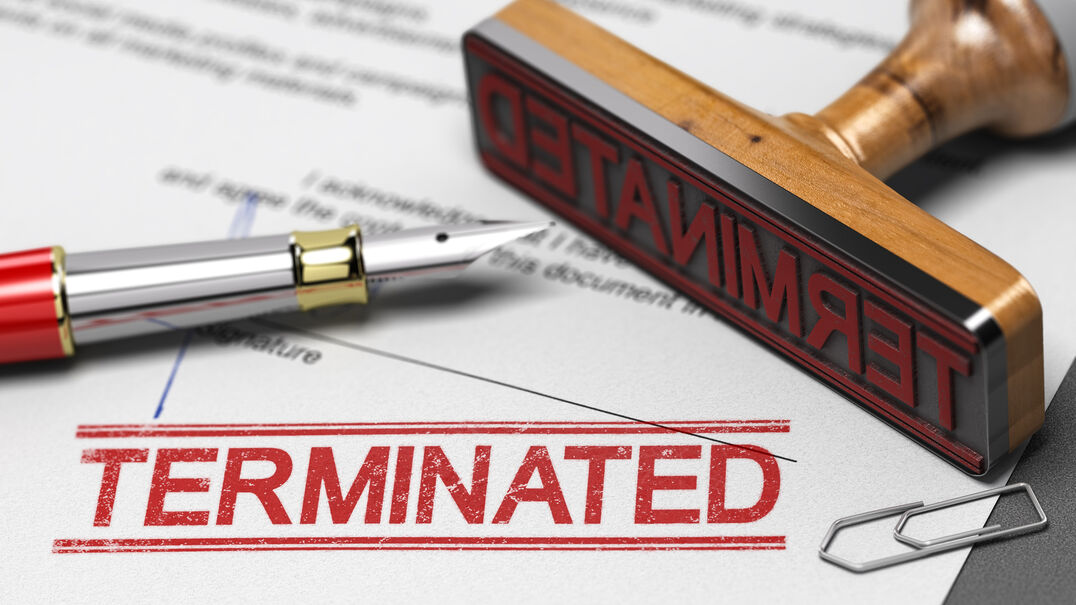
Lessons when terminating for major building defects
When terminating a contract for the sale of land, the case of Willis v Crosland [2021] VSCA 320 makes it clear that practitioners for both parties need to understand the effect of express contractual provisions entitling a party to terminate the contract, and to read those provisions very carefully to ensure they have been complied with.
Special conditions and lingering land tax
Purchasers need clear and thorough advice where special conditions prevent them from clearing unpaid land tax.
It's just a transfer of land
Some clients think preparing a transfer of land between related or associated parties, or parties well known to the practitioner should be a simple and cheap job. Based on our claims and comments from practitioners at our LPLC Risk Management Intensives, preparing a transfer of land is anything but simple.
Trust money: handle with care
Managing the receipt and payment of trust money is not a simple administrative task and needs careful attention by practitioners to avoid claims.
Timing matters to prevent unnecessary double duty surprises
When clients buy property, the order in which they start land development and nominate a new purchaser can unnecessarily double the duty payable. Lawyers who provide the right advice at the right time can help avoid this.
Land tax adjustments aren’t standard
When acting in conveyancing transactions, practitioners should always consider and advise clients on whether land tax is adjustable at settlement, and the basis and timing of the adjustment.
Beware of tax issues when advising your client
Practitioners should always be mindful of the potential tax consequences of a transaction. Each year the LPLC sees claims where the practitioner has overlooked the tax implications of a matter or considered that it’s not their role to advise on tax issues or recommend that the client obtain tax advice from a tax lawyer or accountant.
Land dealing certifications need to be taken seriously
Acting in a conveyancing transaction includes certifying that identity and authority have been verified and where there is a paper title, that it has been obtained and either destroyed or invalidated. These certifications need to be taken seriously and only given if they are true. In the case of Trani & Anor v Trani & Ors (No 2) [2019] VSC 723 the Court found a conveyancer was liable for providing false certifications as to identity and authority to the Registrar of Titles.
Establishing identity
This LIJ article looks at the recent case of C&F Nominees Mortgage Securities Ltd V Karbotli & Ors [2020] in which the Court found reasonable steps to verify identity were not fulfilled and provides some key takeaways for lenders and their legal advisers.
Acting For Private Lenders Can Be High Risk
Acting for private lenders in short term, high interest urgent loans is fraught with risk even for the most diligent solicitor. This LIJ article covers a claim in which this was the case, suggests some lessons practitioners can learn from it and provides some tips on how to reduce risk.
New VLSB+C eConveyancing guide – 3 things you need to know
The Victorian Legal Services Board and Commissioner has published a guide, E-Conveyancing: Regulatory Guidelines that contains the regulator’s expectations of practitioners conducting electronic conveyancing.
Practitioners may need to make changes to their current conveyancing practices in light of the regulator’s expectations. This article highlights 3 important areas covered by the guide and offer some risk management suggestions.
Subject to finance – timely reminder
Subject to finance clauses have always been a source of claims but attention needs to be paid to them more than ever in this current uncertain economic climate. There are two recurring mistakes we see in claims that are particularly relevant at the moment.
Avoid the section 32 traps
Every year LPLC sees conveyancing claims where the cause of the claim is defective section 32 disclosure. To properly advise clients practitioners need to understand the vendor disclosure obligations in the Sale of Land Act 1962 (Vic).
Destroy titles or make them invalid?
Practitioners need to have in place a process to either destroy any paper titles or make them invalid in accordance with clause 6 of schedule 3 to the ARNECC Model Participation Rules.
*The ARNECC Model Participation Rules, Operating Requirements and corresponding Guidance Notes may have been updated since this article was published. Please refer to their most recent versions via the links provided at the bottom of this page.
Acting for yourself may not pay off
Self-represented law firms cannot recover costs in respect of work performed by partners, employed solicitors or other employed staff. There are many reasons why it is not a good idea to act for yourself in litigation, the recent outcome in Bell Lawyers Pty Ltd v Pentelow illustrates one of them.
What's the difference between a default notice and a rescission notice?
The decision to serve a default or rescission notice requires a clear understanding of what outcome the client is trying to achieve. Ambiguous wording or poor communication risks ending the contract before the client wishes. This article looks at when to serve which, and some of the common pitfalls involved.
Handy hints for GST
Here are some handy hints to help you navigate your next GST question. The starting point for all GST questions should be: is the vendor registered for GST or required to be registered?
Determining the right diagram location document
When preparing a S32 statement section 32I of the Sale of Land Act 1962 (Vic) requires that a diagram location document, identifying the land and location, be attached. How do you determine what the diagram location document is? A particular section of the Register Search Statement holds the key.
Property damage insurance claims: How long have you got?
Keep limitation periods at the forefront of your mind when taking instructions to act in indemnity insurance claims. Read the policy wording carefully to determine when the insurer’s liability arises and clarify quickly when the damage occurred.
Electronic conveyancing obligations – be prepared for a compliance examination and subscriber review
Subscribing to electronic conveyancing is not a ‘set and forget’ process but requires checking regularly that you are complying with your subscriber obligations, particularly in relation to client authorisation, verification of identity, right to deal, document retention and system security. Regular checking should also mean that you are well prepared for a compliance examination and the subscriber review process.
*The ARNECC Model Participation Rules, Operating Requirements and corresponding Guidance Notes may have been updated since this article was published. Please refer to their most recent versions via the links provided at the bottom of this page.
How to avoid the traps
Acting on behalf of purchasers of land is a common occurrence for many practitioners. However, not every transaction is the same and practitioners need to be wary of what can go wrong.
Law Institute Journal Conveyancing Special Edition 2019
For the May 2019 edition of the LIJ, LPLC contributed a series of feature articles focused on conveyancing. This page provides an overview and links to each article in the series.
Off the plan: managing the risks
Off-the-plan purchases are risky transactions for purchasers. They involve buying a property based on plans and artistic images without the benefit of a physical inspection.
E-conveyancing can be e-fficient
Four practitioners from four different sized and structured firms how they have adapted to using the electronic conveyancing system. The firms all joined the first and, at the time, only electronic lodgement network operator, PEXA, at different times in the last five years.
Taxing times in conveyancing
All conveyancing practitioners need to have a basic understanding of tax issues to at least alert clients there may be a problem and send them off for more expert advice
Time to rethink conveyancing
This is the first in a series of articles produced by LPLC with a focus on conveyancing. In this article, LPLC CEO Justin Toohey, sets the scene by discussing the need to go back to basics and re-examine the way firms manage conveyancing transactions for clients.
When the stake is at stake
Good systems and checklists to ensure compliance with procedural aspects of conveyancing are important preventative aspects of risk management. Stake-holding is a good example of when difficult situations may arise.
Section 32 statements: the basics
Providing satisfactory disclosure to meet the standards set by the Sale of Land Act 1962 (Vic) (SLA) for every property transaction that crosses your desk requires significant legal knowledge and training backed up with good systems, processes and precedents.
This article contains details of some of the important aspects of the disclosure requirements to assist those preparing section 32 statements.
The value of conveyancing
The root cause of many conveyancing claims stems from the cost and time pressure practitioners feel to meet client expectations. Communicating the complexity and attention to detail of the transaction can help clients understand the value of your conveyancing service.
In this article LPLC’s Chief Risk Manager, Heather Hibberd, discusses the ways practitioners can communicate the value of their conveyancing services.
How to avoid an off-the-plan claim
Whether acting for vendors or purchasers in ‘off-the-plan’ sales, there are risks you need to be aware of and things you can do to avoid those risks.
5 things your purchaser clients really want to know
This article covers five key things purchasers want to know from their lawyer.
3 things your vendor clients really want
Because conveyancing matters comprise a lot of moving parts, and often seems to be a routine process, it can be easy to lose sight of what is important to your client. Here are 3 things your vendor clients really want to know.
Inactive owners corporations – are they really?
Have you had vendor clients tell you their owners corporation is inactive because they have never had any meetings?
Email instructions in relation to payment of a bank cheque – what would you do?
The following article discusses security concerns in relation to receiving payment instructions via email.
A bad plan
A critical issue for any purchaser of an ‘off the plan’ property is ensuring the actual property accords with what they intended to purchase. Therefore, when giving pre-contractual advice to purchasers, it is essential to identify any deficiencies in documentation that could hinder a proper assessment by the purchaser.
Every conveyance is unique
Conveyancing clerks and lawyers should not assume that what appears to be a straightforward conveyance actually is a straightforward conveyance. It is important to read and understand the contract of sale, section 32 statement and any other relevant documents before advising the client.
Risks for the bank of mum and dad
Practitioners asked to act in transactions where parents lend money to their children to help them buy a house should stop and think about the transaction. Who are they acting for? Who else could think the practitioner is looking after their interests?
Conveyancing claims on the rise
What risk management practices are you doing to avoid a conveyancing claim? In 2016/17 LPLC received 127 conveyancing claims and notifications which represented approximately 30 per cent of all claims and notifications received that year.
Do I have a conflict?
LPLC regularly receives calls from practitioners seeking guidance about a potential conflict when acting for both the vendor and purchaser of real estate.
When taxes need to be raised
This article contains claims examples from both family law and conveyancing where there was an alleged failure by a practitioner to raise tax issues with the client.
Misplaced trust
There are some important steps to take when handling trust money. The LPLC sees numerous claims against practitioners who are alleged to have distributed trust money to a party not entitled to receive it. For risk management purposes, two critical points in time are when a client instructs a practitioner to receive money on trust and when a client instructs a practitioner to transfer trust money.
Trusts and family farm transfers
LPLC has received claims against practitioners who expected a duty exemption on the transfer of farming real property but failed to meet all the necessary criteria, resulting in the exemption being denied
A sad tale about acting for vendor and purchaser
Sometimes claims arise where a practitioner acts for both the vendor and purchaser in a conveyancing transaction.
Verify identity to avoid a claim
Practitioners need to take reasonable steps to verify the identity of clients in order to avoid claims, as well as comply with common law obligations and Victoria’s electronic conveyancing Participation Rules.
Section 27 frustration – release of deposits
LPLC regularly receives questions from practitioners about the release of deposits pursuant to section 27 of the Sale of Land Act 1962 (Vic). They are usually acting for the vendor and are frustrated that the purchaser has objected to the release or refused to sign the section 27 statement.
Stop to consider your options
This article from 2016 looks at a claim where the practitioner acted for a vendor selling their home under pressure from their mortgagee.
Rebates and risk management
This article from 2015 covers claims relating to the use of rebate clauses. In addition to exposing practitioners to a complaint, the use of rebates can also expose a practitioner to a claim.
Intra-family transfers continue to result in claims
LPLC continues to receive claims arising from practitioners acting in intra-family transfers.
Be careful when handing over certificates of title
Did you know that LPLC has published a checklist of policies for law firms? Policy number 20 is about providing client documents to the client or another firm.
Foreign investment traps
Practitioners should be aware of foreign investment risk management issues.
Should you include leases in section 32 statements? There’s no easy answer
Unfortunately there is no easy answer to the enquiries LPLC has received from practitioners seeking our view on whether a lease needs to be included in a section 32 statement.
More land tax woes
This blog contains a case study of a land tax claim.
Old claims, new laws
The following article covers common claims related to preparing S32 statements.
When family ties unravel
Practitioners need to be wary when acting for family members in asset transfers.
Land can be taxing
Addressing land tax issues before entering into a lease or contract can avoid problems later.
Congestion Levy, Adjustments and Section 32 Statements
This article from 2013 covers the Congestion Levy Act 2005 (Vic) and how it relates to the preparation of Section 32 statements.
Purchasers’ problems with the lot
This article contains details of claims against practitioners when acting for purchasers off-the-plan and the lessons to be learned from those claims.
Caveats, charges and their traps
Consider these risk management issues when dealing with caveats and charges.
Owner-builder danger zone
Particular care must be taken when negotiating one complex area of property law. Owner-builder provisions can be disastrous for vendors and their solicitors in a falling property market.
Subject to finance extensions – not what they appear
We have seen circumstances where extensions to ‘subject to finance’ clauses were misunderstood. Many subject to finance clauses provide for an ‘approval date’, being the date by which the purchaser’s loan must be approved.
Be sure before disbursing trust money
When acting as stakeholder, you need to check that any conditions for disbursing the money have been strictly met and keep appropriate documentary evidence.
Owners corporation certificates hazards
The introduction of the Owners Corporations Act 2006 (OC Act) on 31 December 2007 has caused many teething problems for conveyancing practitioners. There is also potential for ongoing problems as clients become aware of their obligations under the OC Act.
Snapshot of Major Victorian Property Tax Changes effective from 1 January 2024
The State Taxation Acts and Other Acts Amendment Act 2023 received Royal Assent on 12 December 2023. The new law introduces significant property tax changes in Victoria with effect from 1 January 2024.
Major changes proposed to Victorian property tax laws
Note update to this Alert: The State Taxation Acts and Other Acts Amendment Act 2023 received Royal Assent on 12 December 2023. The new law introduces significant property tax changes in Victoria with effect from 1 January 2024. On 13 December 2023, LPLC published a Snapshot of Major Victorian Property Tax Changes effective from 1 January 2024.
On 3 October 2023 the State Taxation Acts and Other Acts Amendment Bill 2023 (the Bill) was introduced into the Victorian Parliament. The Bill, if passed, will shortly result in significant changes to Victorian tax laws in the areas of land tax, windfall gains tax (WGT) and duty.
Solicitors and conveyancing practitioners should be alert to and familiarise themselves with these major changes now and be ready to promptly update their law practice’s processes and precedents.
Key proposed changes include:
New Windfall Gains Tax — what you need to know
The new Windfall Gains Tax (WGT) introduced by the Windfall Gains Tax and State Taxation and Other Acts Further Amendment Act 2021 commences on 1 July 2023. In broad terms, WGT applies to land rezoned after 1 July 2023. However, practitioners need to be across the issues now, particularly if negotiating long term sale contracts, or options, that will settle after that date that may then be subject to the WGT.
Updated ARNECC Model Participation Rules and Operating Requirements for e-conveyancing
Version 6 of the Model Participation Rules and Model Operating Requirements governing the use of electronic conveyancing platforms (ELNs) in Australia have recently been published and adopted by the Victorian Registrar of Titles and will apply from 12 April 2021.
*The ARNECC Model Participation Rules, Operating Requirements and corresponding Guidance Notes may have been updated since this Alert was published. Please refer to their most recent versions via the links provided at the bottom of this page.
GST withholding practical examples
This alert contains practical examples in question and answer format of how the purchaser GST withholding provisions work. For general information about the withholding requirements see the alert Some purchasers required to withhold GST from 1 July 2018.
PEXA, email, electronic funds transfers and cyber-crime
On 25 June 2018 LPLC published a security warning for PEXA users arising from some recent instances of fraudulent activity impacting PEXA transactions. One of these (‘the MasterChef case’) involved a fraudster entering the PEXA workspace and changing payment account details to divert $250,000 of the proceeds of sale into another bank account controlled by the fraudster.
Some purchasers required to withhold GST from 1 July 2018
From 1 July 2018 purchasers of certain new residential premises and potential residential land will be required to withhold the goods and services tax (GST) and pay it to the Australian Tax Office (ATO).
The new requirements are set out in subdivision 14-E of Schedule 1 to the Taxation Administration Act 1953 (Cwlth) (the schedule) as amended by Treasury Laws Amendment (2018 Measures No.1) Act 2018 (Cwlth)(amending Act) Schedule 5. The ATO has published LCR 2018/D1, a companion ruling which contains a number of practical examples.
Security warning for PEXA users
Recent news reports and emails from PEXA have described a fraud involving the PEXA workspace. Any users of the PEXA workspace need to read this alert for tips on how to avoid this happening to them.
Sections 55 and 55A of the Estate Agents Act 1980 (Vic)
This bulletin replaces the previous bulletin dated March 2013.
Sale of Land and the PPS Act
Practitioners for both vendors and purchasers need to understand that the Personal Property Securities Act 2009 (Cth) (PPS Act) may apply to a contract of sale of land because:
- Sometimes a vendor selling land, also sells goods to the purchaser.
- Sometimes a vendor selling land also transfers a licence to the purchaser.
- The sale of land may be subject to a lease where the vendor may have received a cash security deposit from the tenant.
- The sale of land may be subject to a lease where the vendor may have also leased goods to the tenant.
The LPLC recommends that practitioners consider the matters in this Alert when acting in relation to the sale of land.

Know your limits
With the proliferation of time limits in legislation today, missing limitation dates is a mistake that occurs in many areas of the law leading to claims. This LPLC Practice Risk Guide lists the limitation periods that have caught practitioners out in recent years. It also gives some claims examples of how the mistakes have occurred and the lessons we can learn from those mistakes.

Superannuation — LPLC Practice Risk Guide
This LPLC Practice Risk Guide focuses on helping practitioners to avoid the types of claims relating to superannuation matters that arise in family law, wills and estates and property work. In all areas simple oversight is the most common cause of claims.

Claim Free Conveyancing
Claim free conveyancing is an LPLC Practice Risk Guide produced to help practitioners identify and avoid the most common mistakes resulting in claims in conveyancing transactions. The guide aims to raise awareness of how and why mistakes occur, and put practitioners in a better position to stay claim free.

Managing mortgage risk
This LPLC Practice Risk Guide guide examines the risks involved in acting for lenders, borrowers and guarantors.
Tax Issues
This checklist covers the most common tax issues and related charges. Includes duty, CGT, lodging fees, land tax and subdivisions.
Checklist for advising purchasers when vendors default
Advice practitioners need to give purchasers when vendors are in breach of the contract of sale, to enable the purchasers to make informed decisions.
Many of these issues are also relevant to advising vendors who have breached the contract.

Sale of land - questions for the vendor
This checklist contains essential questions for the vendor during the sale of land.

Purchase of land – questions for the purchaser
This questionnaire includes questions to ask purchasers of land and indicates when practitioners may be required to seek additional information.
Subdivision limitations
Time limits most commonly missed in relation to subdivision.
Tax limitations
Time limits most commonly missed in relation to tax.
Bankruptcy limitations
Time limits most commonly missed in relation to bankruptcy.
Contribution limitations
Time limits most commonly missed in relation to contributions.
Contracts limitations
Time limits most commonly missed in relation to contracts.
Confiscation limitations
Time limits most commonly missed in relation to confiscation, a claim example and lesson learned.
Appeals limitations
Time limits most commonly missed in relation to appeals, a claim example and lessons learned.
Personal properties securities limitations
Time limits most commonly missed in relation to personal properties securities, a claim example and lessons learned.
Land acquisition limitations
Time limits most commonly missed in relation to land acquisition.
International contracts for the sale of goods limitations
Time limits most commonly missed in relation to international contracts for the sale of goods.
Instruments limitations
Time limits most commonly missed in relation to instruments, a claim example and lesson learned.
Liquidator limitations
Time limits most commonly missed in relation to liquidation, a claim example and lessons learned.
Caveats limitations
Time limits most commonly missed in relation to caveats, a claim example and lessons learned.
Superannuation checklist
This checklist is designed to help practitioners avoid common mistakes when acting in superannuation matters. Practitioners may find it helpful to use it alongside our Superannuation practice risk guide
Face to face verification of identity
A step-by-step process and checklist for face-to-face verification of identity (VOI).
VOI client information for practitioners
This document is an annotated version on the VOI Client Information Sheet designed to assist practitioners while using it. The VOI client information sheet is designed to send to the client before they attend your office to inform them what to bring to the interview and to obtain details from them beforehand.
VOI client information sheet
This VOI client information sheet is designed to send to the client before they attend your office to inform them what to bring to the interview and to obtain details from them beforehand.
Vendor's practitioner checklist
This checklist will help you to avoid many mistakes made by vendor’s practitioners in conveyancing transactions.
Purchaser's Practitioner Checklist
This checklist will help you to avoid many mistakes made by purchaser’s practitioners in conveyancing transactions.
Checklist for advising vendors when purchasers default
This checklist provides guidance on the advice practitioners need to give vendors when purchasers are in breach of the contract, to enable the vendors to make an informed decision.
Many of these issues are also relevant to advising purchasers who have breached the contract.
Electronic Property Transactions
A checklist covering common issues faced by legal practitioners when dealing with electronic property transaction matters.
Electronic Property Transactions – Office Management
A checklist containing a list of issues to consider when writing office policy regarding electronic property transactions and recommended responses.
Property websites and comments
This checklist is a list of links to web resources relating to property that will help you conduct research. LPLC has provided commentary under each resource to explain best how to use it.
Sale of real estate — acting for a purchaser
Acting for purchasers in real estate transactions often involves tight time frames and significant commercial pressures. A wide range of legal and practical issues must be considered, and attention to detail is critical.

Sale of real estate — Acting for vendors
When acting for vendors in real estate transactions, practitioners must navigate a complex landscape of legislation, risk, and compliance.

Navigating the complexities of caveats under S.89 of the Transfer of Land Act
Many caveats are validly lodged and sustainable, but sometimes there are uncertainties and complexities that expose practitioners to risks including cost orders, disciplinary action and claims.

Duty exemptions when transferring real estate from a trust
Claiming a duty exemption for the transfer of real estate from a trust to a beneficiary may seem simple however, the case law indicates an exemption can be fraught with complexities and risks to practitioners. Missing a crucial requirement can trigger unexpected duty liabilities.

Tech Solutions for Risk Reduction in Property Law
In this webinar Laura Vickers, Accredited Specialist in Property Law and Principal Lawyer, Nest Legal, shares her experiences with technology solutions that can assist practitioners doing property and conveyancing work.

Commercial and Industrial Property Tax (CIPT): Navigating the new reform
This webinar covers the latest changes in property tax law, and helps to navigate the transition from stamp duty to an annual property tax for commercial and industrial properties in Victoria.

Windfall gains tax essentials
In this series of short videos, James Hamblin, Special Counsel at MinterEllison, speaks with LPLC's Phil Nolan about the key dates and issues practitioners need to be aware of to manage their risk in relation to windfall gains tax.
Windfall gains tax — Contract of sale risk management
What should practitioners consider in a contract of sale involving land that may be rezoned and subject to WGT?
James Hamblin, Special Counsel at MinterEllison, speaks with LPLC's Phil Nolan and outlines some of the key issues to be managed in the contractual issues between the parties.
Windfall gains tax — Payment and deferral
How does payment and deferral of the windfall gains tax work? What causes a deferral arrangement to cease? What are the time limits associated with payment and deferral?
James Hamblin, Special Counsel at MinterEllison, speaks with LPLC's Phil Nolan and outlines the current understandings around payment and deferral of windfall gains tax.
Windfall gains tax — Assessment and objections
What should practitioners look for on the taxpayer’s assessment and what form might objections take and when should they be lodged?
James Hamblin, Special Counsel at MinterEllison, speaks with LPLC's Phil Nolan about assessments and objections.
Windfall gains tax — Exclusions
What exclusions should practitioners be aware of in relation to windfall gains tax (WGT)?
James Hamblin, Special Counsel at MinterEllison, speaks with LPLC's Phil Nolan and outlines the main exclusions from WGT on rezoned land.
Windfall gains tax — Exemptions
What are some of the criteria that may mean that a rezoning of land is exempt from windfall gains tax?
James Hamblin, Special Counsel at MinterEllison, speaks with LPLC's Phil Nolan and outlines some of the potential exemptions from WGT.

Windfall gains tax — Key dates
What are the key dates to pay attention to when it comes to Windfall Gains Tax (WGT)?
James Hamblin, Special Counsel at MinterEllison, speaks with LPLC's Phil Nolan and outlines the WGT dates to be aware of.
In broad terms, the WGT applies to land rezoned from 1 July 2023, but practitioners need to be across the key dates and issues ahead of time, particularly if negotiating long term sale contracts, or options, that will settle after that date that may then be subject to the WGT.

Purchaser finance and terms contracts
In this webinar Phil Nolan, Risk Manager at LPLC, takes you on a deep dive into the key risk areas of purchaser finance and term contracts.

Windfall Gains Tax is here — Understand it and act now
Windfall Gains Tax (WGT) affects lawyers with clients buying, selling or developing land re-zoned from 1 July 2023. This includes not just conveyancers, but those working in property development, lending, family, commercial and other areas of law.

Compliance Audits – Are you ready?
An audit of your conveyancing transaction files can be stressful and time consuming. The key to getting a 5-star review is to make sure you comply with the ARNECC and PEXA requirements. In this webinar you will hear from the experts about compliance examinations by Land Registry Services and Subscriber Reviews by PEXA.

Conveyancing and three key issues
Presenter Phil Nolan considers risk management and three areas in conveyancing that come up regularly in enquiries to LPLC - disputes about release of deposits, obligations imposed on owner-builders and owners corporations issues.

Conveyancing and VOI
Verifying the identity of your client is not only important but essential for all conveyancing transactions including any transfer of land. In this instalment of the Conveyancing Series, Phil Nolan, Risk Manager with LPLC, provides details on the why, when and how of VOI.

Conveyancing and conflict
Every year LPLC receives claims involving conflict of interest, especially in conveyancing matters. In this interactive instalment of the Conveyancing Series, Phil Nolan Risk Manager with LPLC, provides details of conflict scenarios including acting for vendor and purchaser and purchaser and nominee. Information is provided about relevant legislation, rules, the common law and complaints about practitioners acting in conflict. Conflict scenarios are presented with discussions on different solutions to various issues.

Windfall Gains Tax — Beware The Sleeping Duties
In this webinar tax specialist presenter Matthew Cridland, Partner - K&L Gates, discusses the new Windfall Gains Tax (WGT) provisions that come into operation on July 2023 and what practitioners will need to consider now. Matthew also provides an update on the circumstances where the expanded 'economic entitlement' provisions may apply, potentially triggering a duty liability.

Conveyancing and Caveats
Every year LPLC receives claims involving caveats where failing to manage the legal issues is the most common cause of those claims. In this instalment of the Conveyancing Series Phil Nolan, Risk Manager with LPLC, provide details of caveat claims and considers various legislative provisions and cases about caveats, and provide tips on avoiding caveat claims. Ethical issues are considered including withdrawing a caveat without instructions and terminating the retainer where a caveator will not take a practitioner’s advice.

Exploring the recent revenue ruling on land development
This webinar explores the risks and issues around land development and nomination that can lead to purchasers paying more duty. Our tax specialist presenters discuss the recent State Revenue Office Revenue Ruling about what activities constitute land development.

Conveyancing title issues
This instalment of the Conveyancing Series considers the basics of title issues as well as more complicated issues like dealing with a restricted unit on a strata plan of subdivision.

Stamp duty and land tax: Tips and 'trips' you need to know
This webinar provides practical guidance to help identify and manage commonly overlooked stamp duty and land tax issues that arise on business and property transactions.

Conveyancing Tax Issues
In this webinar, Phil Nolan considers the most common errors practitioner’s make involving GST, CGT, land tax and duty in conveyancing transactions. This session covers some practical exercises to demonstrate the root causes of claims and Phil provides tips on how to avoid those claims.

Subdivisions and Risk Management
Part 5 of the Conveyancing Series webinars considers issues about subdivisions and off-the-plan contracts which have arisen in claims.

Breaches and Risk Management
Part 4 of the LPLC conveyancing webinar series considers issues about breaches which have arisen in claims and provides risk management tips about how to properly advise clients, using a checklist to ensure important issues relating to the breach are dealt with and how to recognize when it is necessary to refer a client or brief a barrister.

Best practice for purchasers
This third webinar topic in the LPLC ‘Conveyancing series’ addresses the issues that practitioners need to consider and advise on, when acting for a purchaser.
Contract of sale tune-up
The second topic covered in LPLC’s 2020 ‘Conveyancing Series’ follows on from the previously held 'Building a better section 32 statement' webinar and looks at contracts of sale. Presented by LPLC Risk Manager, Phil Nolan.
Building a better section 32 statement
Every year the LPLC sees claims related to inadequate section 32 statements under the Sale of Land Act 1962 (Vic). This is the first in LPLC's Conveyancing Series 2020 webinars presented by LPLC Risk Manager, Phil Nolan.

Conveyancing tax issues
Seminar from 2019's Risk Management Intensive. Presented by Phil Nolan, Risk Manager, LPLC.
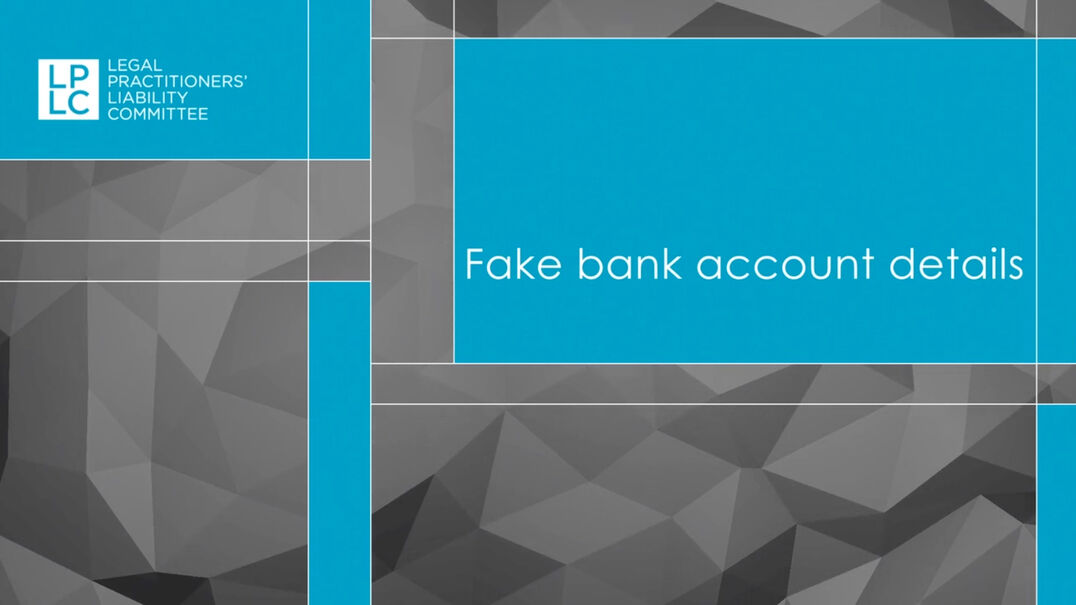
Fake bank account details
More and more lawyers and their clients are becoming victim to fake emails. The key risk areas are conveyancing, wills and estates, sales of business and family law – areas where lawyers are holding and transferring large sums of money for their clients.
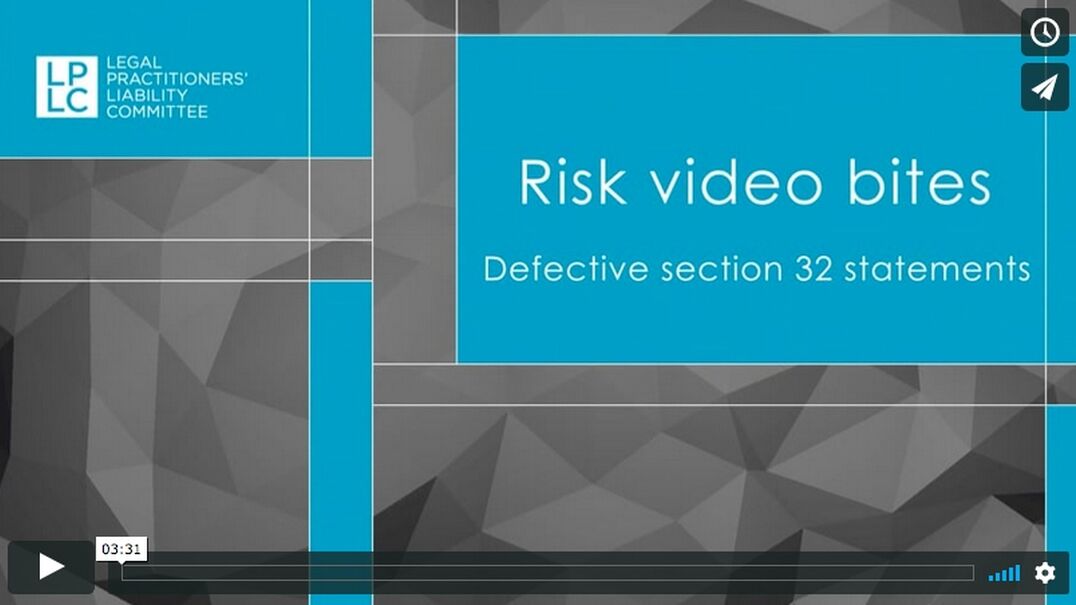
Defective section 32 statements
The sale and purchase of land is a complicated process regardless of which party you act for. Did you know there are over 30 pieces of legislation conveyancing practitioners need to know about? When acting for a vendor one crucial role for a practitioner is to ensure that the section 32 statement is correct. It takes a lot of work to get it right.

Inadequate advice
The conveyancing process is unfamiliar for many purchasers of real estate. The role of a practitioner acting for a purchaser buying land includes understanding what the client intends to do with the property, explaining the contract to the client and ensuring they understand what is required of them.

What property lawyers do well
Seminar from 2018's Risk Management Intensive. Presented by Philip Nolan, Risk Manager, LPLC.
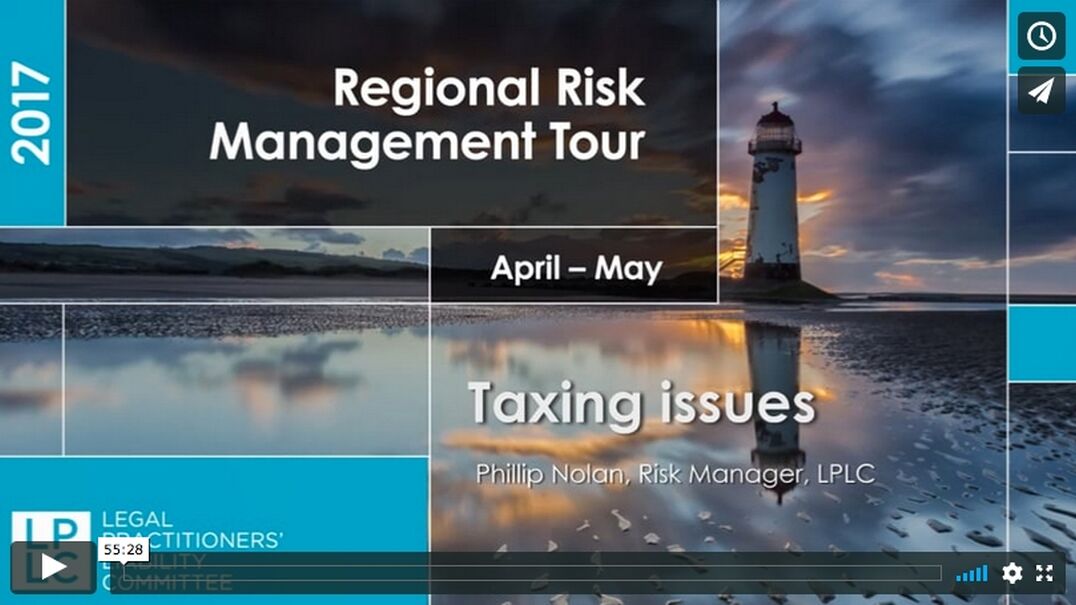
Taxing Issues
In this seminar LPLC Risk Manager, Phil Nolan, provides practitioners with information to avoid claims associated with duty, land tax, CGT and GST.
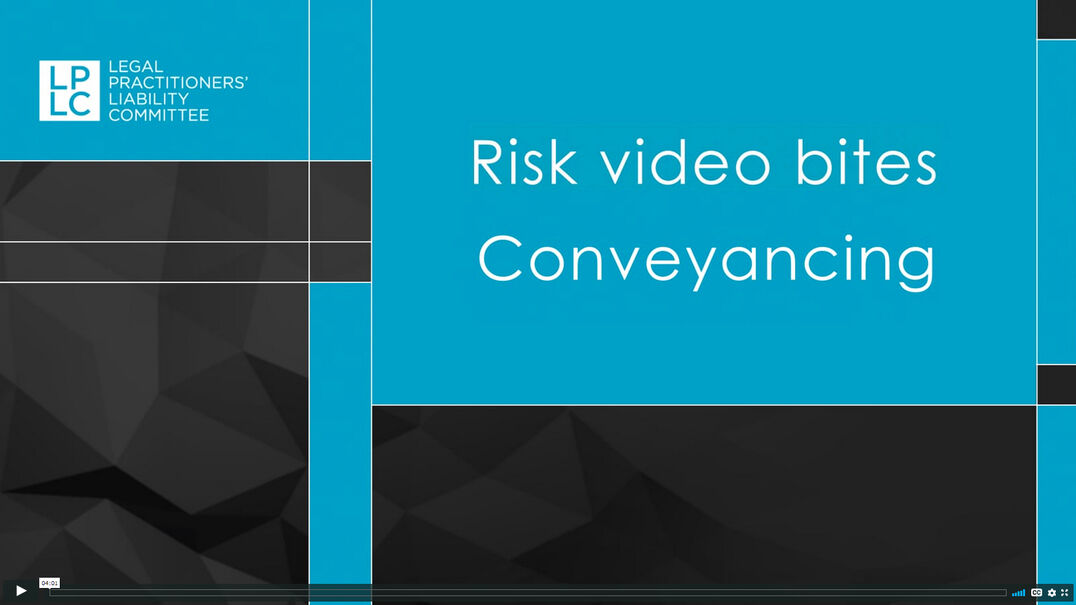
Conveyancing
Following a checklist can often help practitioners avoid a claim, especially when doing conveyancing. While conveyancing looks deceptively simple, it actually involves a huge amount of detail that can be easily missed. Using a checklist can guide practitioners through the transaction and help them cover all the issues and avoid a claim.
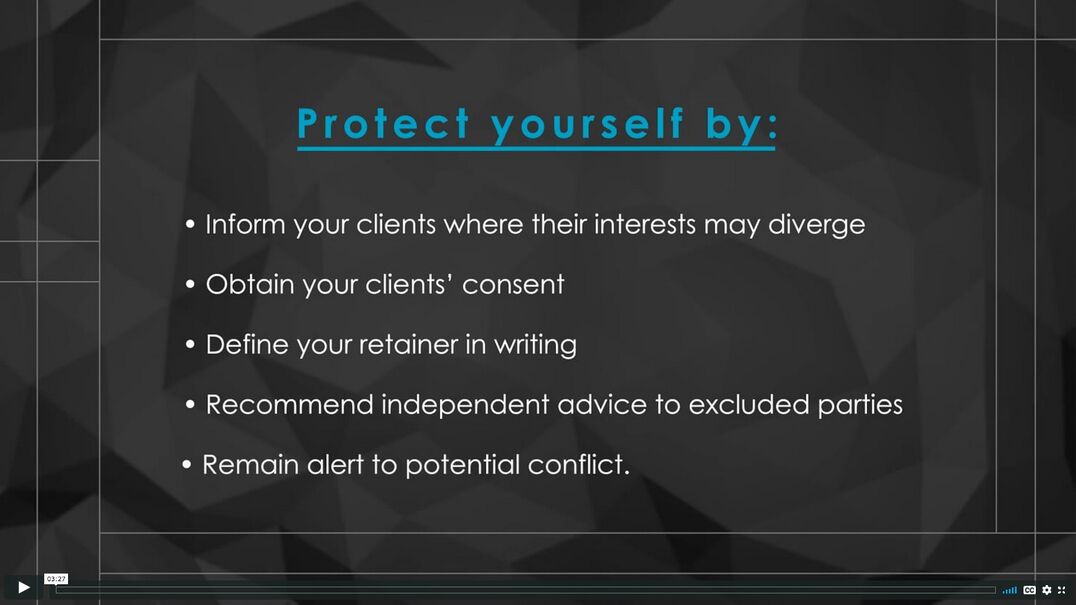
Conflicts
Practitioners who act for multiple parties are often caught unaware by conflicts, which can be difficult to anticipate and arise before the danger becomes apparent. This leaves the practitioners exposed to allegations of breach of duty and the conduct rules, and preferring the interests of one client over another. In acting for more than one party, you create a minefield for yourself.
More on conveyancing
Major changes proposed to Victorian property tax laws
Note update to this Alert: The State Taxation Acts and Other Acts Amendment Act 2023 received Royal Assent on 12 December 2023. The new law introduces significant property tax changes in Victoria with effect from 1 January 2024. On 13 December 2023, LPLC published a Snapshot of Major Victorian Property Tax Changes effective from 1 January 2024.
On 3 October 2023 the State Taxation Acts and Other Acts Amendment Bill 2023 (the Bill) was introduced into the Victorian Parliament. The Bill, if passed, will shortly result in significant changes to Victorian tax laws in the areas of land tax, windfall gains tax (WGT) and duty.
Solicitors and conveyancing practitioners should be alert to and familiarise themselves with these major changes now and be ready to promptly update their law practice’s processes and precedents.
Key proposed changes include:
New Windfall Gains Tax — what you need to know
The new Windfall Gains Tax (WGT) introduced by the Windfall Gains Tax and State Taxation and Other Acts Further Amendment Act 2021 commences on 1 July 2023. In broad terms, WGT applies to land rezoned after 1 July 2023. However, practitioners need to be across the issues now, particularly if negotiating long term sale contracts, or options, that will settle after that date that may then be subject to the WGT.
Windfall Gains Tax Fact Sheet — Act Now
The new Windfall Gains Tax (WGT) will potentially impact real estate transactions that your clients enter into now, if those transactions relate to land in Victoria that is rezoned on or after 1 July 2023.
Clients should be alerted to the potential tax liability and how it may apply to them.
Windfall gains tax essentials
In this series of short videos, James Hamblin, Special Counsel at MinterEllison, speaks with LPLC's Phil Nolan about the key dates and issues practitioners need to be aware of to manage their risk in relation to windfall gains tax.
Windfall gains tax support service
Struggling to find the answer to a question about Windfall Gains Tax (WGT)? LPLC can help.
Windfall gains tax hub
The new Windfall Gains Tax (WGT) introduced by the Windfall Gains Tax and State Taxation and Other Acts Further Amendment Act 2021 commences on 1 July 2023.
In broad terms, WGT applies to land rezoned after 1 July 2023.
Practitioners need to be across the issues now, particularly if negotiating long term sale contracts, or options, that will settle after that date that may then be subject to the WGT.
We've put together information and resources to help lawyers understand the legislation, manage the associated risks and provide guidance about how to act now to avoid surprises later.
Manner of holding property — do your clients understand?
Clients who own property jointly may not appreciate the differences that flow from owning property as a joint tenant or as a tenant in common.
Are you preparing a terms contract?
When drafting a contract of sale of land, be careful not to inadvertently create a terms contract.
LPLC receives claims where practitioners acting in conveyancing transactions inadvertently prepare a contract of sale of land which falls within the definition of a 'terms contract' under Part I Division 4 (ss29A to 29W) of the Sale of Land Act 1962 (SLA).
Subscribe to LPLC News & Alerts
Subscribe to receive the latest Risk Management resources, updates and news directly to your inbox.